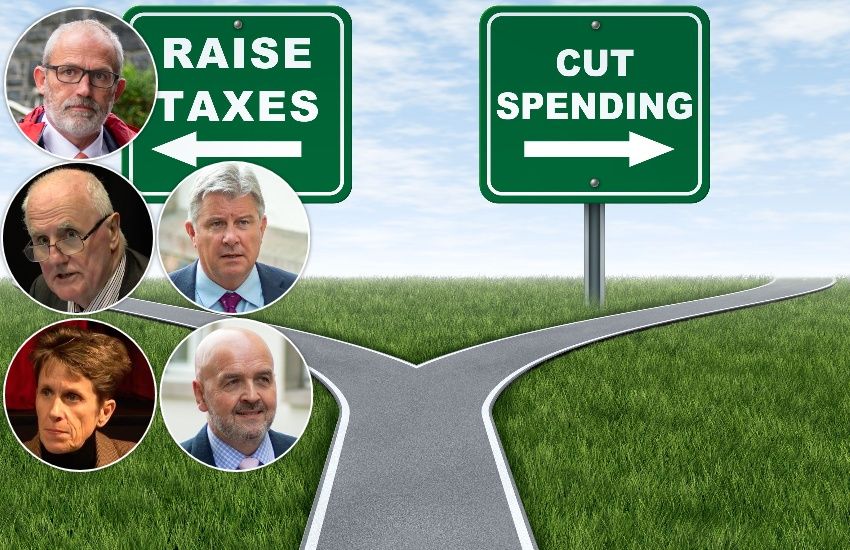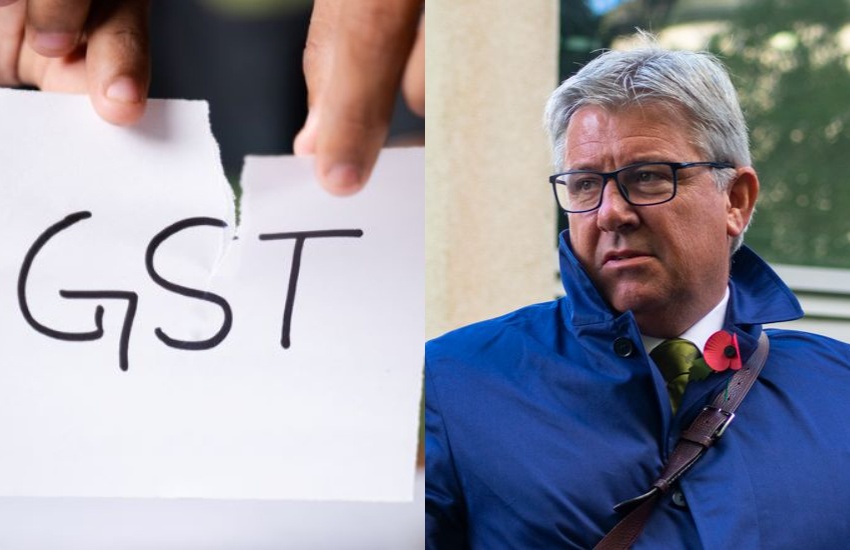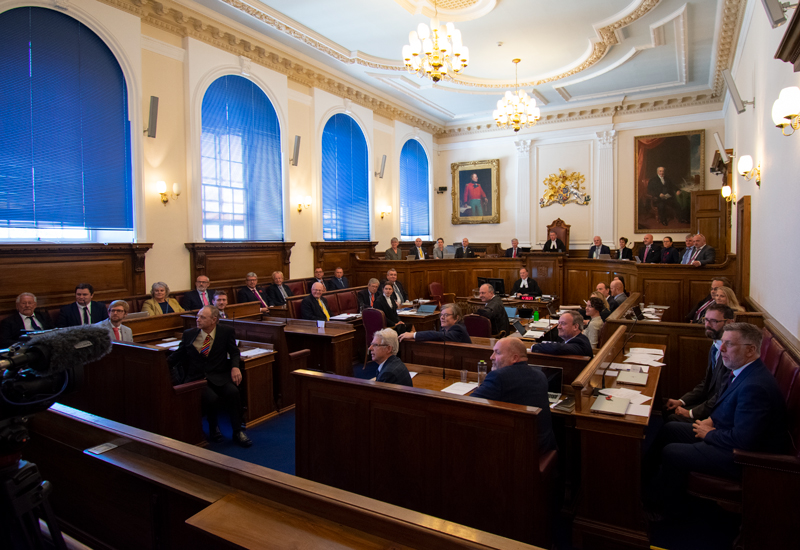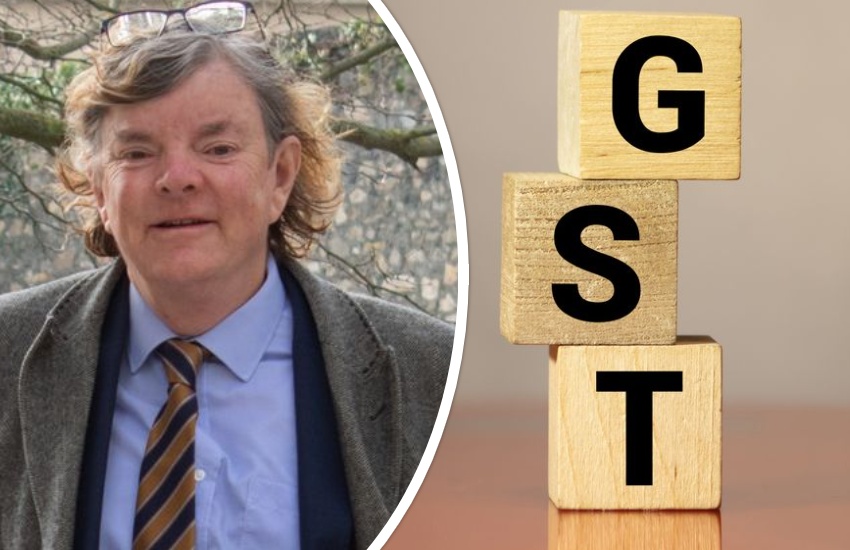


Reductions in States' spending from new efficiency savings are expected to fall to just £600,000 next year.
This includes around £200,000 from how the States procure goods and services and £200,000 from how States' property is managed.
But it is millions of pounds less than earlier projections about cost reductions through efficiency savings.
Many of those projections date back to the last States' term, although after its election in October 2020 the current Policy & Resources Committee used its first annual Budget to make it clear to other States' committees that it would be "unsustainable" to continue meeting their funding requests in full and enjoined them to "scrutinise, review and show restraint in expenditure to ensure that the level and cost of public services provided is affordable and realistic".

Pictured: Many deputies started this term of the States believing there was enough 'fat' in the public sector to make significant efficiency savings.
In the two years since then, the Committee has completely revised its expectations of what can be achieved through efficiency savings.
Its President, Deputy Peter Ferbrache, blames his predecessors, and last week told the States' Assembly that the previous plan was "the worst plan I've ever seen in all of my life - business, professional or States-wise". He labelled revised expectations for efficiency savings as "pathetic".
Deputy Ferbrache and his Treasury lead, Deputy Mark Helyar, published their Committee's Budget proposals for 2023 overnight and issued their starkest warning yet that a projected medium-term deficit in States' finances of up to £85million a year will be resolved only by substantial tax increases or equally substantial cuts to spending and public services.
And they announced that this decision - presented as a binary choice - would have to be made by the States in January when the Committee takes its long-awaited review of long-term tax and spending requirements back to the Assembly.

Pictured: The 2023 Budget, published overnight, makes it clear that the States are heading into a crucial few months when they will need to choose between big tax rises or big spending cuts.
Deputy Helyar said that the 2023 Budget, which projects an overall deficit in public finances of £43million after capital spending is taken into account, "underlines the deficit we are already running, which is worsening each year" and warned that the island faced "a growing structural deficit and, if it is not addressed, next year’s Budget could see some very big cuts to budgets".
Deputy Ferbrache said: "This Budget paints a stark picture of how fast the cost of providing our existing services is rising. These are services people rely on and we need to face the very serious problem of how we fund them in the future.
"If we're not prepared to do that, we must make the even more difficult decision of which ones we will stop. It's a choice we cannot avoid as funding will simply start to run out. So we need to have a grown-up conversation and have the courage to make what may be unpopular decisions very soon."

Pictured: Treasury lead Deputy Mark Helyar and his colleagues on the Policy & Resources Committee have been struggling for more than a year to persuade their colleagues in the States of the need to increase taxes on individuals and families.
The Committee has said previously that it wants to introduce a goods and services tax (GST) at 5% or 8%, but opposition from other deputies has forced it to defer its proposals on two occasions - once in October last year until July this year and a second time until the fourth quarter of this year - and commission a review earlier this year about whether the island's company tax system could be modified to provide more income.
It is not yet clear whether GST remains part of the Committee's plan to balance the books, but yesterday the Committee said: "The tax review is approaching its conclusion and proposals will be published for consideration at the January 2023 meeting of the States. The Assembly will need to make difficult decisions about the future management of the States’ finances. If this is not done, each successive budget will become more difficult to balance.
"There is currently no agreed solution to [the] structural deficit. In January, the States will be asked...to agree measures for raising additional revenue to continue to fund public services. If additional revenue cannot be raised, it is likely the 2024 Budget will need to include major reductions in expenditure, possibly up to 10%, resulting in significant cuts to existing services."

Pictured: In January, States' members face the most important debate about tax and spending in the island since the zero-10 company tax system was agreed in 2006.
This month, the Committee celebrates the second anniversary of its election. In that time, expectations about efficiency savings are not the only area where it seems to have changed its mind.
At the time of the general election in 2020, Deputy Jonathan Le Tocq was the only member of the current Committee who clearly told voters that he was prepared to contemplate backing GST.
Back then, Deputy Le Tocq said: "I used to work for VAT in the UK and have seen first hand how regressive and expensive to implement and oversee such taxes can be. So I still wish to avoid introducing a GST unless absolutely unavoidable.
"However, we cannot simply keep on increasing things like TRP and fuel duty. Similarly, we are over reliant on taxing employment and income. We have some taxation on spending now in the form of excise duties and imports. If it can be demonstrated that a proportionate reduction in income tax and/or other taxes could be achieved with the introduction of an expanded form of tax on spending. I would be content to consider it."
Deputy Ferbrache did not absolutely rule out backing GST, but he said he was "in principle against it" and told voters that "the burden on business and the taxpayer is too high".

Pictured: Deputy Charles Parkinson, who opposes significantly increasing personal taxes until more tax is collected from the corporate sector, has said that the Policy & Resources Committee should consider its position if it continues to propose GST but cannot secure the support of the States.
In 2020, the other three members of the current Committee were more adamant that they would never support GST.
Deputy Helyar, who as Treasury lead will be expected to front the Committee's tax-raising proposals in January, noted that there were "calls for higher taxation" but said they "can only drive us towards long-term decline".
"I believe if we start down the path to higher taxation we will see business opportunity reduce and costs rise in all areas," said Deputy Helyar at that time. "Our young people, wealthy residents and businesses in all sectors will not stay in an island where there is no opportunity. History tells us that in almost every jurisdiction, once a new tax is introduced, it never goes away. Once we put our taxes up, we will have let the genie out of the bottle."
On GST specifically, Deputy Helyar told voters that he was "against it as it harms the poorest in society".
Deputy David Mahoney was equally clear, telling voters: "More than ever, post-covid, the demands on public funds must be tightly controlled and scrutinised like never before. Our grandchildren must not be left holding the can for today’s poorly thought out policies and spending. In the coming sitting, there may be pressure from some quarters to impose a sales tax and I will not support this."
Deputy Soulsby, now the Committee's Vice President, said then: "I have always been opposed to GST as it is not progressive and voted against looking into it in the previous term. The debate will not go away until we have a sustainable tax system, which we do not have at the moment, and which is why the tax and benefits review is going to be critical next term."
Pictured (top, clockwise from top left): The members of the Policy & Resources Committee: Deputies David Mahoney, Mark Helyar, Jonathan Le Tocq, Heidi Soulsby and Peter Ferbrache.
States' spending set to increase by nearly £50m next year
Toughest situation for "donkeys' years"
2023 Budget proposals out today
"We're nearing the day that we will have to turn off services"
P&R tight-lipped on whether tax proposals remain on track
Firm appointed to review whether companies could pay more tax
FOCUS: Opposition across the States to P&R's latest GST plan
EXPLAINED: Why the States' leaders believe GST is needed now
Comments
Comments on this story express the views of the commentator only, not Bailiwick Publishing. We are unable to guarantee the accuracy of any of those comments.